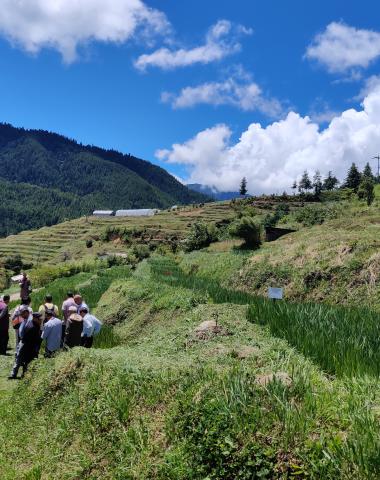The Himalayan Agroecology Initiative (HAI) was prominently featured in two back-to-back high-level events focused on sustainable food systems and agroecological transformation.
On 27 July, HAI was highlighted at the UN Food Systems Summit +4 Stocktake (UNFSS+4) side event titled “From Aspiration to Action: Country Experiences on Mainstreaming Agroecology as a Food Systems Transformation Pathway.” Co-organised with the Agroecology Coalition, Biovision Foundation, World Future Council, and other like-minded organisations, the event showcased how governments and non-state actors from Africa, Latin America, Southeast Asia, and the Himalayan region are embedding agroecology within national frameworks such as climate strategies, nutrition plans, and food systems transformation pathways.
The session emphasised policy coherence, investment alignment, and integration with global sustainability goals. Dr. Ram Krishna Shrestha, Joint Secretary of Nepal’s Ministry of Agriculture and Livestock Development and Coordinator of the country’s Technical Working Committee for Agroecology, shared key insights from Nepal’s experience. He highlighted:
Nepal’s Agroecology Roadmap (2025–2045) was created through a deeply inclusive process, led by LI-BIRD in collaboration with government and supported by World Future Council and IFOAM – Organics International under the Himalayan Agroecology Initiative (HAI).
Nepal is aligning agroecology with its Five-Year Plan, re-evaluating agricultural subsidies, and exploring climate, biodiversity, and nutrition finance to support implementation.
A multi-tiered governance structure ensures ongoing participation of civil society, farmer groups, and academia in the implementation and monitoring of the roadmap.
Co-lead Organisers:
- Ministry of Agriculture and Environment – Vietnam
- Ministry of Agrarian Development – Brazil
- Ministry of Agriculture and Livestock Development – Nepal
- Ministry of Agriculture – Zambia
Co-organisers:
Agroecology Coalition, Biovision Foundation, World Future Council, Fundación Alpina, European Commission – Joint Research Centre, ICEI, IFOAM – Organics International, Instituto Regenera, United Nations Foundation, University of Coimbra – Centre for Functional Ecology, Alliance Bioversity – CIAT India, LI-BIRD, Tarayana Foundation
From 29–31 July, the HAI team also participated in the regional conference “From Green Revolution to Green Evolution – Promoting Agroecological Approaches for Sustainable Transformation of Agri-food Systems in South Asia.” Madhur Gandhi, Project Coordinator of HAI at IFOAM – Organics International, presented a comprehensive overview of the initiative’s vision, structure, and progress:
HAI is one of three components of IFAD’s Integrated Agroecology Value Chains Project (IAVCP) and serves as the knowledge management and capacity-building arm. Led by the World Future Council and IFOAM – Organics International, it works closely with Access Development Services, which leads the other two components:
- Component 1: Brokering and facilitation for public-private investments in agroecological value chains
- Component 2: Investment support and de-risking for 4P (Public–Private–Producer Partnerships) start-ups
- Component 3 (HAI): Capacity-building and knowledge-sharing for policy transformation
HAI aims to empower local stakeholders across the Himalayan region (India, Nepal, and Bhutan) to design and implement agroecological policies and programmes that strengthen livelihoods, resilience, and sustainability. Key outcomes include:
- Development of shared roadmaps for scaling up agroecological food systems
- Greater capacity among local actors to lead transformation
- Strengthened national, regional, and global support for agroecology
HAI is built on a bottom-up methodology involving:
- Himalayan Agroecology Task Force (HATF) and Technical/Advisory Committees established across the three countries
- Extensive consultations at national, provincial (Nepal), state (India), and dzongkhag/gewog (Bhutan) levels
- Focus group discussions and key informant interviews
- Collaboration with CSOs and development partners for synergy
Nepal:
- 37 national and 2 sub-national policies reviewed
- Agroecology being integrated into agriculture policy, bill, and development strategy
- Inclusion of roadmap actions in annual government programmes
- Growing political interest and commitment from high-level officials
India:
- 88 national and 36 sub-national policies analysed
- Advisory and technical committees established
- Roadmap development underway through consultations in four states: Uttarakhand, Himachal Pradesh, Nagaland, and Meghalaya
Bhutan:
- 34 policies and strategies reviewed
- National consultations held in February 2025
- Roadmap aligned with the Agrifood Sector Strategy 2034 and 13th Five-Year Plan
- Local-level consultations held in Dagana, Kana, Khebisa, Chukha, Metakha, and Logchina
Challenges and Way Forward
Gandhi highlighted several pressing challenges to scaling up agroecology in the region, including limited understanding of agroecology as a holistic food systems approach, policy environments that continue to favour conventional agriculture, high transition costs with inadequate support, weak agroecological research, and difficulties in sensitising top political leaders and securing their buy-in for the agroecology agenda.
To address these barriers, he called for greater investment in capacity-building for local stakeholders, the development of a stronger and more unified narrative to counter mainstream food security arguments, and governance reform through inter-ministerial coordination. He also pointed to the potential role of national mechanisms, such as Bhutan’s proposed inter-ministerial agroecology body, as well as regional collaboration through SAARC and other international organisations to initiate and support similar efforts across member countries.
Our goal is to adopt a whole food systems approach and reform the governance structure accordingly. To achieve this, the Bhutan Agroecology Roadmap proposes an inter-ministerial body to align policies and facilitate transformation of the country’s food system through agroecology.
Project Coordinator, IFOAM - Organics International




